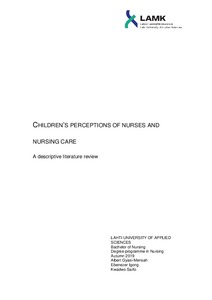Nursing informatics competences of Finnish registered nurses after national educational initiatives: A cross-sectional study
Kaihlanen, Anu-Marja; Gluschkoff, Kia; Kinnunen, Ulla-Mari; Saranto, Kaija; Ahonen, Outi; Heponiemi, Tarja (2021)
Kaihlanen, Anu-Marja
Gluschkoff, Kia
Kinnunen, Ulla-Mari
Saranto, Kaija
Ahonen, Outi
Heponiemi, Tarja
Elsevier
2021
Julkaisun pysyvä osoite on
https://urn.fi/URN:NBN:fi-fe2021080942634
https://urn.fi/URN:NBN:fi-fe2021080942634
Tiivistelmä
Background: Nursing informatics competences (ie. knowledge and skills in electronic and structured documentation) have become a necessary prerequisite for nurses to carry out their professional roles. Therefore, there is a global need to integrate nursing informatics into nursing curricula. In Finland, the requirements to increase nursing informatics education were noted in eHealth strategies in 2015. However, it is not known whether these educational initiatives have succeeded in increasing nursing informatics competences of recent nursing graduates.
Objectives: To examine whether nurses who graduated after the Finnish educational initiatives have higher nursing informatics competences than nurses who graduated before the initiatives. Additionally, the associations of age, gender, work setting and geographical area with the nurses’ informatics competences were examined.
Design: Cross-sectional study.
Settings: The study was carried out between October–December 2018 in Finland.
Participants: Registered nurses who graduated before (n = 931) and after (n = 712) the 2015 educational initiatives.
Methods: Nursing informatics competences were measured by four items: (1) terminology-based documentation, (2) patient-related digital work, (3) general IT competency and (4) electronic documentation according to structured national headings. The associations of the year of the graduation and demographic background variables with nurses’ overall nursing informatics competence and also separately with four specific competence items were examined with analysis of covariance.
Results: Nurses’ graduation year was associated with their overall nursing informatics competence and the specific competence related to terminology-based documentation. Nurses who had graduated after the initiatives had higher competence than nurses with earlier graduation years. Associations were also found between age and work setting with the nursing informatics competences. Younger nurses and nurses working in specialised healthcare and elderly care had the highest competence.
Conclusions: The national eHealth strategies with educational initiatives seem to have affected favorably on nursing informatics education in Finnish nursing programs and have potentially led to increased nursing informatics competences of recent nursing graduates. The results of this study highlight the importance of educational policies stating the directions and objectives of education programs.
Objectives: To examine whether nurses who graduated after the Finnish educational initiatives have higher nursing informatics competences than nurses who graduated before the initiatives. Additionally, the associations of age, gender, work setting and geographical area with the nurses’ informatics competences were examined.
Design: Cross-sectional study.
Settings: The study was carried out between October–December 2018 in Finland.
Participants: Registered nurses who graduated before (n = 931) and after (n = 712) the 2015 educational initiatives.
Methods: Nursing informatics competences were measured by four items: (1) terminology-based documentation, (2) patient-related digital work, (3) general IT competency and (4) electronic documentation according to structured national headings. The associations of the year of the graduation and demographic background variables with nurses’ overall nursing informatics competence and also separately with four specific competence items were examined with analysis of covariance.
Results: Nurses’ graduation year was associated with their overall nursing informatics competence and the specific competence related to terminology-based documentation. Nurses who had graduated after the initiatives had higher competence than nurses with earlier graduation years. Associations were also found between age and work setting with the nursing informatics competences. Younger nurses and nurses working in specialised healthcare and elderly care had the highest competence.
Conclusions: The national eHealth strategies with educational initiatives seem to have affected favorably on nursing informatics education in Finnish nursing programs and have potentially led to increased nursing informatics competences of recent nursing graduates. The results of this study highlight the importance of educational policies stating the directions and objectives of education programs.
Kokoelmat
Samankaltainen aineisto
Näytetään aineisto, joilla on samankaltaisia nimekkeitä, tekijöitä tai asiasanoja.
-
Virtual Reality and its use in surgical nursing training : a literature review into the effectiveness of Virtual Reality as a new practical educational method for training Registered Nurses in surgical nursing
Jokinen, Felipe Ignacio (2021)The general purpose of this thesis was to review the literature available to Virtual Reality to ascertain if the technology has a possibility to augment or become a more effective way to train Registered Nurse students in ... -
Cultural Diversity in Finnish Health Care: A COMPARISON OF NURSE MANAGERS, NATIVE-FINNISH REGISTERED NURSES, AND IMMIGRANT REGISTERED NURSES PERSPECTIVES AND EXPERIENCES OF CULTURAL DIVERSITY IN THE FINNISH HEALTHCARE WORK ENVIRONMENT
Atanga, Josephine; Mwangi, Caroline; Ghimire, Dibya (2022)Background: There is a global scarcity of healthcare workers, particularly in Western countries such as Finland resulting in a greater reliance on foreign-trained professionals to fill the gap in the nursing workforce. ...Rajoitettu käyttöoikeus / Restricted access / Tillgången begränsad -
Children's perceptions of nurses and nursing care : A descriptive literature review
Gyasi-Mensah, Albert; Sarfo, Kwadwo; Igong, Ebenezer (2019)Hospitalization can be a very stressful and traumatic experience for children. Children have a limited understanding of procedures and hospital environment. Thus, it is even more important for health care professionals to ...


